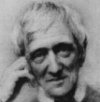
Punishing children for their parents' sins
An ancient form of the decalogue contains this threat:
Is God really like that? Does God so callously punish innocent people?
|
|
First ObservationIn olden times the Israelites were firmly convinced that every disaster should be explained somehow or other as a punishment by God for a specific crime. We read, for instance, that a famine occurred during David’s reign. A divine oracle was consulted, which stated:
David agreed. He arrested seven of Saul’s sons and handed them over. The Gibeonites hanged them and left their corpses to rot in front of the sanctuary at Gibeah. After a few months the bodies were taken down and buried.
When we read a passage like this, we should be extremely careful in interpreting it. It looks as if it was God who wanted the sin of Saul avenged: “The Lord said, ‘Saul and his family are guilty of murder” (2 Samuel 21:1), and finally, “After that, God answered their prayers.” But we know from other scripture texts (see below) that it would be a mistake to think thus. What we find in episodes such as these is not straightforward revelation but a record of what the people at the time were thinking about God. It was a rationalisation on their part which it would be a mistake for us to consider inspired! |
|
Second ObservationThe early Hebrews were convinced that God punishes children for the sins of their parents. But this notion was corrected in later centuries. In the example of the famine under King David mentioned above, they thought God wanted to punish Saul’s children for their father’s crime. This happened in the 9th century before Christ. But, in the course of time, God corrected this notion very clearly and specifically.
The same principle was also laid down as a general rule in the Law:
This gives us plenty to think about! When the innocent sons of Saul were put to death because of their father’s crime, this was not what God was asking for. It was what the Israelites thought God wanted. It was their rationalization. And, don’t forget, to this imagined wish of God they ascribed the famine. They thought: This famine must be due to some crime someone has committed, for why would God otherwise punish us? Ah, it must be Saul’s injustice towards Gibeon. If we punish Saul’s sons, God will be satisfied and will take the punishment away. The whole chain of thought was simply a rationalization! We know now that all this thinking was wrong. The famine was not a punishment on God’s part. He was not happy about the killing of Saul’s sons. The only thing we can say is that God tolerated this kind of thinking until he found the right moment to correct it once and for all. But notice: we find the rationalizations squarely in Scripture! |
|
Third ObservationRationalizations often grow as they are handed on from one generation to another. In the second book of Samuel an epidemic of pesitlence is ascribed to punishment by God because David had taken a census of the people. 2 Samuel 24,10-25
God eventually forgives David, but only after having killed 70,000 people through the pestilence and after David had erected an altar on a hill outside Jerusalem. Ascribing the epidemic to God was clearly a rationalization.
The first book of Chronicles also narrates the same episode in David's life. But in the narration of the same event in 1 Chronicles, it is not God butSatan who is blamed.
Again we find the same process of rationalization and ascribing causes. When an epidemic occurred, the people looked around for the culprit. It was decided it had to be David’s taking the census. Later, they became convinced that Satan must have had a hand in it! But taking a census surely was not a sin. In the priestly account of Israel’s journey through the desert, which was written down centuries later, the census of the people is prescribed as a duty.
Again we come to the same conclusion: In spite of what David’s contemporaries thought, the epidemic was not due to a punishment by God for David’s taking the census. Their rationalizations were not correct. |
|
Fourth ObservationJesus clearly rejects the rationalizations of interpreting physical ills as punishments inflicted by God. When Jesus and his disciples walked outside the Temple of Jerusalem, a similar case occurred. The apostles saw a man known to have been blind from birth - an interesting topic of discussion for the Jews. For, thinking that a defect of this kind must be a punishment for sin, they did not know to whom to ascribe it. The apostles refer the matter to Jesus:
The blindness was not due to anyone’s sins. Thousands of people are born with defective eyesight or with some other handicap. This is not due to sin. We would be wrong to look for some supernatural explanation. It is due to a mishap of nature. Yet the blindness of the man sitting outside the Temple served a purpose.
|
|
Credits
|
 |
 |
 |
 |
 |
|
|---|---|---|---|---|---|
| Facts |
 |
 |
 |
 |
|||